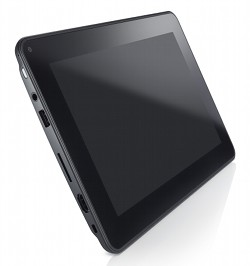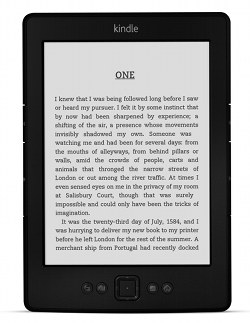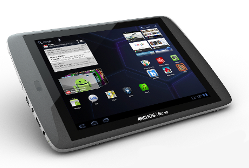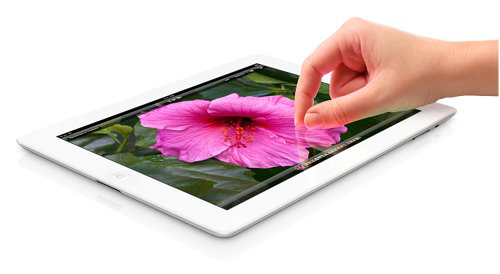Blog posts tagged tablet computers
Why the iPad mini is like a packet of crisps
 When you were growing up, did you ever do that thing where you put empty crisp packets in the oven? (Under parental supervision, of course.)
When you were growing up, did you ever do that thing where you put empty crisp packets in the oven? (Under parental supervision, of course.)
Do it right and the packets would shrink to a fraction of their former size, leaving you with a tiny but ultimately pretty useless crisp packet.
For some reason, that's the image that came to mind when I first saw iPad mini, the latest addition to Apple's iPad range. It's like a normal iPad that's shrunk.
Announced on Tuesday, iPad mini has a 7.9" screen, making it a bit bigger than the iPhone 5 and a bit smaller than the 10" iPad 3 (could this now be called the iPad maxi, or does that sound too much like a feminine hygiene product?).
Is iPad mini overpriced?
Introducing iPad mini is a logical move for Apple. Recent months have seen a number of high-profile 7" tablets hit the market, including Amazon's Kindle Fire HD and the Google Nexus 7. Anyone who wanted a smaller tablet simply hasn't had an Apple product to consider.
And there definitely is a market for these compact tablets. They can be useful for super-portable computing, because they're big enough to use productively but small enough to squeeze into an already-full bag or even slip into a suit pocket.
But with iPad mini prices starting at £269, Apple risks pricing itself out of a lot of sales. Those competing tablets both come in at £100 or so under iPad mini's base price. And they both have better screens - which is surprising when you remember that the big wow factor of the larger iPad is its incredibly crisp Retina display.
Of course, iPad mini is bound to still have Apple's legendary build quality, and will run the vast range of existing iPad apps. But it's not a guaranteed success.
Paying for the name
One of the reasons the larger iPad has done so well is that Apple was the first company that got tablet computers right. There had been other attempts before, but nobody had created a tablet computer that was as stylish, practical, simple and genuinely useful as the iPad. (The same was true of the iPhone and its touch screen.)
But things have moved on since then. I don't think Apple can simply shrink its iPad, slap a big price tag on it and assume people will come running.
What's more, people who've already bought into the Apple way of doing things probably already have an iPhone or an iPad. Will they really want another touch screen device that's just a slightly different size?
I'm not convinced. If it was £100 less, Apple would sell out in moments. It would make a big dent in the tablet prospects of Amazon and Google. Yet at £269 it looks like an expensive gadget, and many businesses will struggle to justify it over its competitors.
How about you? Could you use an iPad mini in your business?
|
You can pre-order the iPad mini direct from Apple from 26 October. Amazon's Kindle Fire HD is available now from £169. The Google Nexus 7 costs £189.99. |
Windows 8 to spark tablet war?
 It's rather got lost in all the recent hype over iPhone 5, but Windows 8 - the next version of Microsoft's dominant operating system - will be available from 26 October.
It's rather got lost in all the recent hype over iPhone 5, but Windows 8 - the next version of Microsoft's dominant operating system - will be available from 26 October.
It can be a risky business being first to adopt a new Windows version. As with any major new software, there are usually a few bugs that need ironing out. Canny companies hold off upgrading until these teething problems are solved.
Windows on a tablet
Having said that, a big Windows 8 push is just round the corner. And it's not just from Microsoft. There are plenty of hardware companies hoping Windows 8's innovative new interface and touchscreen features will drive up their sales too.
What's more, Windows 8 is the first version of Windows to cater seriously for tablet computers. There will be lots of new features to take advantage of touchscreens, and so one exception to the 'don't be first to buy it' rule might be if you want a new tablet computer.
A new tablet from Dell
Take Dell. Anticipating a Windows 8 buzz, the hardware giant has just announced a new tablet that'll launch on the same day as Windows 8. It's the Latitude 10, and it promises to make the most of the tablet-focused features in Windows 8.
Done right, a Windows 8 tablet could be ideal for smaller companies. It should give them all the convenience of a tablet without requireing them to learn how to use lots of new software, or convert files between different formats.
Sure, our experiences with Windows 7 tablets have been underwhelming, but initial reports suggest Windows 8 will be an entirely different beast.
Security in a crowded market
Expect tablets like the Latitude 10 to be of particular interest to companies which handle lots of sensitive data. Dell's tablet puts a big emphasis on security, with support for two-factor authentication. This means you need something you know (like a password) and something you have (like your fingerprint or a smart card) to log in.
But it will be a crowded market. There's Apple's iPad (from £399), of couse. But recent months have seen Google (from £159) and Amazon (from £129) launch keenly-priced tablets. Even Microsoft will be launching a Windows 8 tablet. As Windows 8 draws closer, more Windows tablets will join the fray.
This all means now's a great time to keep an eye on the market, particularly if you like the idea of having a tablet but aren't quite convinced yet. Windows 8 will prompt new models, extra competition and - with luck - some aggressive pricing and innovative features.
Amazon lights a fire in the tablet market
 If you live under a rock or something (or, y'know, just don't spend your days obsessively reading technology news websites) then you might have missed the exciting news that Amazon made a big product announcement a few days ago.
If you live under a rock or something (or, y'know, just don't spend your days obsessively reading technology news websites) then you might have missed the exciting news that Amazon made a big product announcement a few days ago.
The online giant's Kindle Fire tablet computer has been available in the US for quite some time now. Now the company has announced that two improved models are coming to the UK. On paper, they're a tasty proposition:
- The Kindle Fire, a £129 tablet with a 7" screen and 8GB or storage space (not masses, to be honest, but enough to be useful).
- The Kindle Fire HD, which costs from £159 and has a higher-resolution 7" screen, more power and more storage.
Neither of these will be available until 25 October, so it's very hard to say how much of a good buy they'll be until they're out there where we can test them. But they should really do something for the tablet market, posing a serious threat to Google's Nexus, another 7" tablet which gets good reviews and is available from PC World for under £200.
However, although all the attention has been directed at the Kindle Fire, I reckon it's a different Amazon product that's going to be a must-buy for many people.
The new model of its Kindle e-reader will be here on 12 September, and it looks good. Already the best-known e-reader out there, this Kindle is smaller and lighter than any previous models.
But it's the price that's the real eyecatcher. At just £69, it costs about the same as ten paperback books, putting it well into impulse buy territory if you read a lot or commute regularly.
The weight reduction means it might just be the best e-reader yet. The only downside I can see is that there's no 3G connectivity, which means you need to be connected to a wireless network to download books and content.
Whether for reading business bibles on the train or escaping into a novel when you need a break, I think the new Kindle will be making its way into the bags and briefcases of many business owners.
Getting your hands on a KindleThe new Kindle e-reader is released on Wednesday, and the two colour screen models will be available from 25 October. You can order all models now direct from Amazon. |
A cheap tablet computer for business?
 Ok, I’ll admit it. I may have judged things a little early when I said I couldn’t quite see the point of tablet computers. They’re here to stay, without a doubt, and they’re being put to all kinds of interesting uses by all kinds of forward-looking businesses.
Ok, I’ll admit it. I may have judged things a little early when I said I couldn’t quite see the point of tablet computers. They’re here to stay, without a doubt, and they’re being put to all kinds of interesting uses by all kinds of forward-looking businesses.
But there’s still a barrier to mass adoption of tablets, and that’s the price. The most popular, most lusted-after tablet computer by far is Apple’s iPad.
It starts at £399, but you’ll need to spend more like £500 if you want space for lots of files and apps (particularly if you need to store lots of video) or want to be able to get online when you’re not in a Wi-Fi hotspot.
Unless you were lucky enough to snag a dirt-cheap HP TouchPad last year, the iPad’s competitors aren’t much cheaper either. The Samsung Galaxy Tab is powerful enough to give the iPad a run for its money, but you’re still looking at spending at least £350. For a gadget which is still – if we’re being honest – a bit of a punt for a lot of companies, that’s a fair bit of cash to splash out.
Here’s a capable tablet computer for £200
Actually, there’s no shortage of cheap tablet computers on the market. The thing is, most of them either lack the power for serious use, or have simply had too many corners cut in an effort to keep the price tag down. Buy one for your business and you’d be virtually guaranteed disappointment. Hardly a fair trial for new technology in your company.
Things may now be changing, albeit slowly. There’s a relative newcomer that seems to have a powerful processing chip, lots of memory and a decent screen. It’ll almost certainly lack the hewn-from-granite feel of an iPad, but then at half the price you won’t be complaining too much.
This affordable-yet-powerful tablet computer is the Archos 80 G9. Together with its larger sibling, the Archos 101 G9, it represents impressive value on paper. Prices start at under £200, and for £250 you can get a tablet that looks like it’ll give far more expensive models a run for their money.
Spec-wise, it ticks all the important boxes:
- Dual-core central processor, to help the tablet cope with more than one task at once.
- Proper multi-touch screen, so you can use two or more fingers together - for instance, to pinch-and-zoom.
- Good connectivity, including connections for a monitor and memory card slot.
Crucially, the Archos runs Google’s Android operating system. Tablets running Android have fast emerged as the main rival to Apple, ensuring you’ll be able to access a good range of applications and tools. It scores over other cheap tablets by being able to run the very latest version of Android (called, amusingly, Ice Cream Sandwich), which virtually guarantees it’ll last a good while.
The first of many cheap tablets?
As with all cheap tablet computers, the Archos will have its compromises. Reviews have suggested it feels a bit plasticky, and if you compare it side-by-side with an iPad, it’ll be obvious where the extra cash goes.
There’s an excellent chance this end of the market will grow significantly in the months to come, particularly if Amazon decides to release its impressive Kindle Fire in the UK. As the choice of cheap tablets go, better options may emerge.
But right now, it’s finally possible to trial a tablet computer without spending the same amount you’d spend on a decent desktop computer. Perhaps it’s worth considering for your company.
Have you bought a cheap tablet computer? Was it up to scratch or did it disappoint? Leave a comment to let us know.
Now is when the tablet comes of age for business
 Last week’s launch of the new iPad was met with the excitable coverage that inevitably accompanies any Apple product announcement. But beneath the hype, does the new iPad herald wider business adoption of tablet computers?
Last week’s launch of the new iPad was met with the excitable coverage that inevitably accompanies any Apple product announcement. But beneath the hype, does the new iPad herald wider business adoption of tablet computers?
In November 2011, a study of IT adoption trends among UK small and medium businesses (SMEs) found 37% were using tablet computers. Another 37% said they were planning to purchase them.
So there’s a definite enthusiasm for and move towards tablet computers like the new iPad. And perhaps the emergence of cheaper competitors will accelerate this trend.
Why choose a tablet for business?
The real beauty of tablet computers is their portability. Their smart design, integrating everything into one neat, light panel, makes them ideal for use on the move.
They’re particularly useful for visual tasks, like running presentations or referring to spreadsheets, websites or designs when visiting a client. Many tablets let you take notes using a stylus or digital pen. Some will even convert your handwriting into type.
Tablets vs. laptops
Tablet computers tend to cost the same as, or a bit less than laptop computers. But can you really replace a laptop with a tablet? And would you want to?
Tablet are fun to use, at least initially. If you’re not used to using a fast, intuitive touch screen then your first days with a tablet can be really enjoyable.
However, when it comes to processing power, laptops have the edge. The latest iPad has heaps of power by tablet standards, but it won’t hold a candle to many laptops. Still, for everyday tasks that may not matter. You won’t notice a great deal of different when browsing the internet or using email.
The ergonomic issue
If you’re considering buying a tablet, think carefully about how you plan to use it. Typing on a touch screen can be awkward and may even be harmful. At least one study has found tablet users have a higher potential for neck and shoulder discomfort.
“It’s best to avoid typing for any length of time directly on a tablet computer,” warns back pain therapist Diksha Chakravarti. “It’s better to use a peripheral keyboard and stand, and remember to take regular breaks to stretch.”
Boosting battery life
A real bonus for tablet users is that the battery life of these slate-type devices tends to be much better than that of laptops. Your typical tablet computer’s battery will last more than twice as long as your average laptop’s.
This is partly due to the lower power demands of the solid state storage tablets rely upon. They also have other components specifically designed to minimise power use.
One of the trade-offs for this efficiency is in storage space. Tablets are able to hold much less data than your average laptop. Using cloud-based storage can make up the shortfall.
Indeed, tablets and cloud computing are natural partners. Touch screens lend themselves well to navigating web-based applications and you can get a whole host of business tools designed specifically for tablets.
What’s more, because these tools are hosted online (in the cloud), they put less strain on your tablet’s own storage capacity and processing power and are generally more secure, because the data isn’t stored on your easily-stolen tablet.
Should you invest in a tablet for business?
If you currently rely on a laptop as your main computer, replacing it with a tablet is probably not a good idea. Although tablets are super-portable and enjoyable to use, you’ll miss your laptop’s power, storage capacity and keyboard.
However, as a mobile device to complement your main desktop or laptop computer, a tablet can be ideal. Used in combination with the right cloud-based applications, it can seriously increase your productivity.
- Are tablet computers right for business?
- Sure, your iPad is cool. But my netbook is better for business
- iPads: they breed like, er, iPads
This is a guest post from Integral IT, a Yorkshire IT support company.



